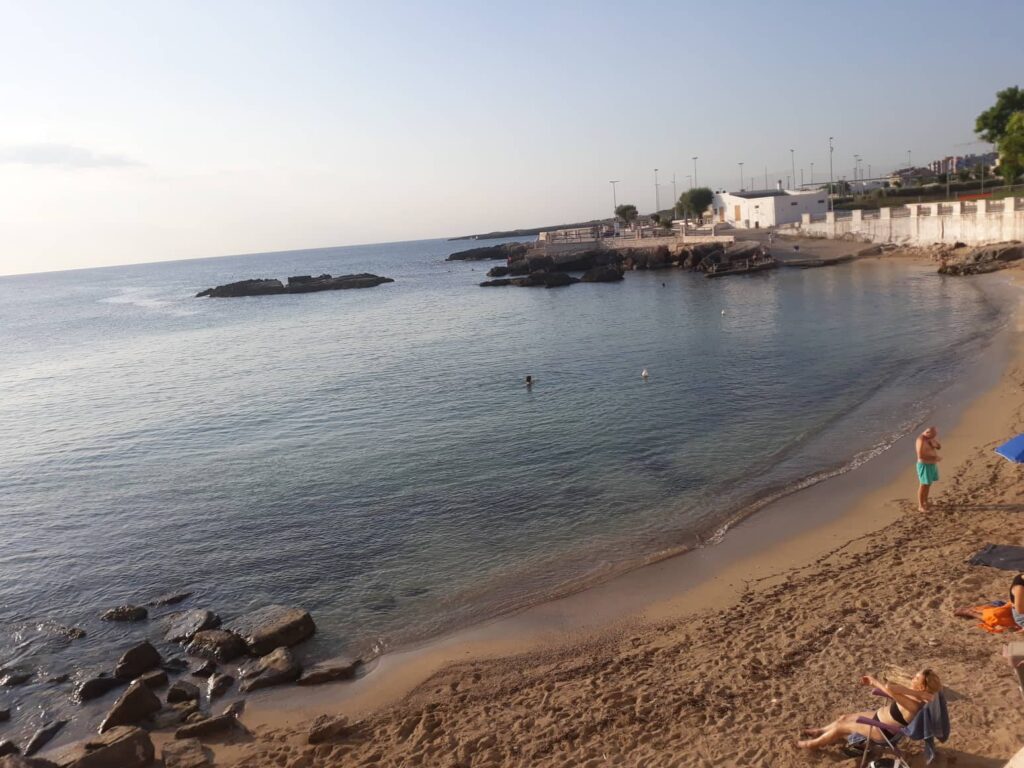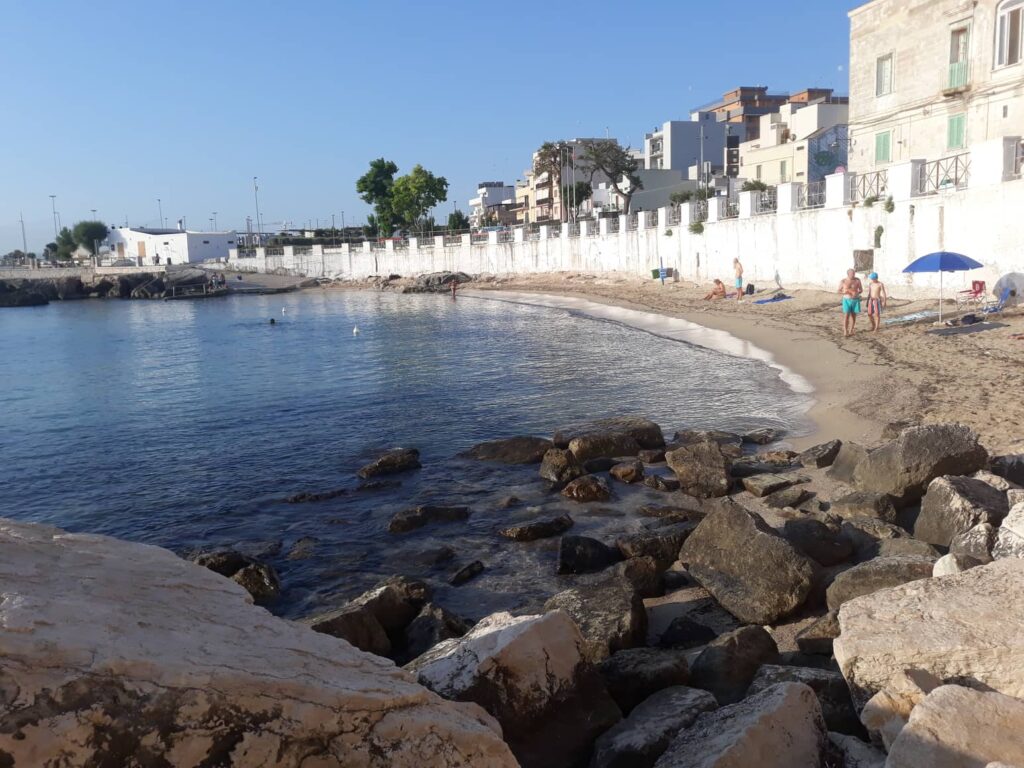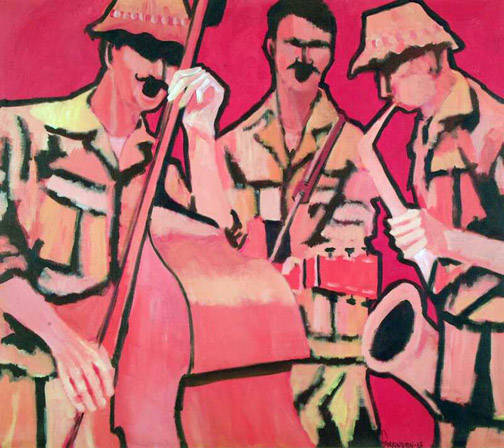Archive for July, 2022
July 28, 1540 Thomas Cromwell is beheaded most ungoodly
Posted by Damien Galeone in Blog on July 25, 2022

As Thomas Cromwell was walked to the executioner’s table that day in front of a crowd of jeering Brits, he was probably wondering exactly how he’d ended up there. Well, he was officially charged with high treason – a crime against authority – but he maybe wondered how it had all gone wrong. He’d started out King Henry VIII’s most trusted confidante. And now he was about to be beheaded in the Tower of London. Life is strange.
Among the crimes listed under ‘high treason’ were speaking badly of the king, counterfeiting, and being born in 16th century England. In Cromwell’s case, high treason was for mentioning that Henry had been unable to get the royal pecker up to consummate his marriage to Anne of Cleves and then failing to annul the marriage. If King Henry VIII enjoyed one activity, it was executing people and nobody was safe from his phlegmatic fury – friends, wives, trusted advisors, babies. For Cromwell’s unforgivable infractions, he came up with some faux charges and had Cromwell executed. If Cromwell had something to be thankful for, it’s that the king changed the execution from being drawn and quartered to being beheaded. Well, thankful until he got there.
There’s a probably apocryphal story that Cromwell’s enemies got the executioner drunk so that he would botch the execution. He did botch it, but whether he needed booze to help him is forever to be speculated upon. It took three whacks to get the job done. And when it was done and the crowd had taken it in, Cromwell was the only sober person there.
As it turns out, getting in trouble was remarkably easy in Tudor England. You could be punished for things like gossiping and drunkenness and you could executed for things like poisoning (but not killing anyone), adultery, or treason (a crime against authority). And the executions took extraordinary forms too. If you poisoned a person, by for example, adding a laxative to a pie, you were boiled to death. This dainty form of execution saw the offender hovering above a pot of boiling liquid (wine, water, tar, oil, dealer’s choice really) while a sadistic executioner dragged out the inevitable by dropping them in and taking them out. Fun. Less fun was being drawn and quartered for high treason. During these wonderful last moments of one’s life, they were dragged by cart to a gallows where they were hanged and, you guessed it, not killed. Once they were in bad shape, they were taken down and their penis and testicles were cut off. Then their stomach was split open and their intestines and organs were removed. Then their head was cut off, parboiled, and left at the city gate for warning to all not to do whatever it was they had done.
Getting executed was one of the most common ways to die in Tudor England. It ranks up there among drowning, playing sports, having bad teeth, disease, and being burned to death in your house. Life usually ended around or before the age of 35 and was almost always unpleasant, violent, or involved awful rashes. Women often died during or after childbirth by fever, infection, or being twelve years old. So, with the probability of dying badly at around 87%, what was there to do?
Drink.
Which is what they did.
The Tudor period has been called the golden age of the alehouse. There were an estimated 12,000 alehouses in England between 1550-1700, which means about 1 per 200 people. Ales were different and composed of different ingredients in each one. One such used hen poop in its ales. But not only for their wares’ hidden ingredients, alehouses were not for the faint of heart. They were indeed a place to go if you wanted to get drunk, smoke (new-fangled) tobacco, and forget your problems (see above: list of ways to die in Tudor England). It was also the place to be if your wanted to play games like skittles, shove-groat, or have an illicit affair (which you could be punished for). It was also the place to be robbed, cheated, and murdered. So, think Hell Angels’ afterparty at Altamont.
Nevertheless, people loved them and they loved drinking, a thing which they did all day every day. Drinking ale, beer (also called mad dog because of its enhanced strength), and wine was to distinct your class. Ale was for commoners, beer was for nobility (and royalty), and wine was for the rich. No matter who you were, you drank. This was partially due to the sound reason that drinking water could kill you with typhoid or cholera. But people made do with a tough situation and since life was probably going to end before 35, why the hell not?
Read the rest of this entry »The Old People’s Trip of Italy
Posted by Damien Galeone in Blog on July 18, 2022

Nothing shows your age more than how you travel. Plus, the number of sounds one makes when standing. When I was younger and didn’t look so much like every school comedy’s representation of a history teacher, I travelled on a shoestring. I lived on street food, grocery store wine, and end of day discounted bakery goods. I’d go for hostels, rooms in flats, couches. One time that couch was behind a building. My motto used to be “Why pay for the Best Western, you don’t travel to sit in a hotel room.”
I was wrong. One of the best parts of this recent trip to Italy was the hotels. Nothing can squash the exhaustion and low grade misery of walking around in the Roman heat, but knowing that I was returning to an air conditioned hotel room with clean sheets and an episode of CHiPs dubbed into Italian sure helped. (It’s somehow better when dubbed into Italian, a language whose only vocabulary I know are those words needed to order gelato.) Each day a cleaning fairy came and dropped off new towels and more toilet paper. The bed was huge. The TV was bigger than the bed. The water pressure was set to elephant cleaner, the heat to Louisiana in August. Glorious.
We talked about our hotel rooms as if it was an attraction in a guide book. We admired the Art Deco Best Western in Rome as much as the Coliseum, we talked about the air conditioning in the B&B in Monopoli as much as the Adriatic Sea. In my thank you note to the cleaning staff of the Hotel Aria, I told them to say goodbye to the breakfasts for me. A note, by the way, I wrote while wiping away a tear with perfumed tissues provided by the hotel.
I’m just going to say it: I’m old. That’s right. It’s true. Not only did I gather this by my change in attitude towards hotels, but there were other clues. The initial clue was in my bags. I packed an entire Ziploc bag dedicated to the various creams that make my body’s life easier. I excitedly told the soccer player next to me on the plane that Ryanair is a phonetic palindrome. I complained about my feet and knees every day. Whenever I caught the eye of a fellow old person, we gave each other the eye roll whose subtext was ‘Man I miss my knees.’ I called a waitress ‘young lady.’ I called a waiter ‘good sir.’ All of the waiters and waitresses called me sir. The six compartments in my pill box had 1. Vitamins A and D, 2. Aspirin and ibuprofen, 3. Benadryl, and 4. Tums. The box came home empty. Compartments 2-4 were empty by day 10.
It was in the town of Monopoli that I realized the true lengths of my oldness. Monopoli is an ancient city on the Adriatic Sea. Narrow cobblestone streets meander between white buildings in the old town. An old stone path has run alongside the sea for centuries. Our first day, we ate at a restaurant on the sea. This place is the first of which we would refer to as ‘a hipster place.’ In our estimation, a hipster place is a restaurant which is trendy and hip and employed by people who are trendy and hip, but neither the place nor those employed there are good at producing food. In this hipster place, we dined on lightly breaded cod pieces with vegetables (i.e. fish sticks on lettuce). The only reason I know the food at hipster places is good is because they tell me it is. Enjoy a moderate of rich parma ham with thinly sliced cheese on crusty artisan bread and wash it down with in-house effervescent oxygenized hydrogen (i.e. a ham and cheese sandwich on old white bread and water). What’s more, everyone else just seems to go along with it, basically because (like me) they don’t have the energy to argue, we just don’t go back to the hipster places. It is the culinary world’s greatest quiet conspiracy. It was while first writing the phrase ‘hipster place’ that I recognized that I am now old. I fretted mildly, but then took an Aleve and that helped.
My suspicions were confirmed on our first morning in Monopoli. I awoke at 6 am and without a Denny’s early bird special to take advantage of, I instead worked out. After exercising, I decided that the best way to cool off was to go to the local old town swimming cove. I put on my trunks, took my vitamins, and walked down there. The swimming cove is part of the old town and generations of Monopolians have swum there and started their day there. I was eager to join in that tradition.

When I arrived (at about 6:45 am) I was not alone. There were probably ten others. All of them were solidly in their 60s. The cove was a soup of old people, floating, breast stroking, and remembering their knees. I got in with them and swam around the broth, bringing my own recollections of a time before hipster places.
They accepted me. Each early morning I went to the cove and swam. I back stroked to the rocks across the way. I breast stroked back. Each day garnered me a few more nods and smiles. I felt a little like Jane Goodall. It was on the third day that I realized they weren’t accepting me as an outsider chimp, they were accepting me as a fellow old person. It was my right as an old person to swim along with all the other seniors who wake up at 5 am and groan as they get out of bed. I drank at lunch that day. Followed by two Aleves and a Tums. I suffered, but at least I suffered in an air conditioned hotel room with Chips in Italian to keep me company.
Senior Slide
Posted by Damien Galeone in Blog on July 11, 2022

When I was in school there was a thing called a ‘senior slide’. The concept here, in case you don’t know, is that when the end is in sight, you slack off work and take a lackadaisical, carefree, ‘you do it’ attitude towards everything.
I used to employ this attitude at most times of the year. Typically it started after the first month of school and would last until everyone else would start slacking – around Christmas, before summer holiday. Surprisingly, it took me 6 years to graduate college.
But some years ago, something quite frankly rude happened. I decided (again, rudely) that my holiday (summer, Christmas, etc) would be better if I did my scheduled work before them and not after them. I don’t know when this awful change in my personality occurred, but it’s a personality failing I regret.
Tomorrow I am leaving for the Adriatic coast of Italy. I have twelve days of pasta, seafood, wine, and lounging to look forward to. And yet, for some reason, I have holed myself up to work on projects that need attention before I go.
This wouldn’t bother me so much if it weren’t for two things. First, I’m supposed to live in the moment, be present, live my life, follow the deep philosophical entreaties of YOLO and “dude, fuck it.” And I’m not. I’m anxious and obsessed. This makes me decidedly less cool than I used to be. Assuming I was then. Second, it’s so nice outside. The beer gardens are calling me, the wine gardens are calling me, gardens are calling me. And yet I hunch over my computer and work and write.
I press myself forth with the knowledge that in something like 20 hours I’ll be on a flight to Italy, my belt will be loosened and I will reject no beer in the airport. Moreover, this allows me to preach the rules of preparedness to my students. And I do this a lot. So you can imagine how much they love me. “Do your work early and you can relax later.”
Read the rest of this entry »The Erie Canal was Built by The Irish and Whiskey
Posted by Damien Galeone in Blog on July 4, 2022

The ceremony in Rome, New York was impressive. Fanfare, politicians, locals. Probably a big pair of scissors. Maybe a buffet. They were undertaking a radical proposal, one that Thomas Jefferson called ‘little short of madness’. The same sentiments cast at his radical proposal 42 years earlier. But he was sort of right. They were about to build a 363 mile canal that would connect the Atlantic Ocean to the Great Lakes. It was America’s first great infrastructure project.
When it was finished eight short horrifying years later, the canal would change everything. It would connect the western interior, make shipping much easier, and open the world to midwestern farm products. It would increase national trade, usher in migration to the West, and cut by half the two-week journey from the Hudson Bay to the Great Lakes. Like an early America version of a lazy river ride, but with fewer dads sipping on cans of Pabst. It was a marvel that would exponentially improve lives and change America.
But for that to happen, someone had to actually build the thing. In the beginning, local farmers and homesteaders dug the canal. But the work was painfully slow and as they moved into the mosquito-rife Montezuma swamps, which exist somewhere between Dante’s fourth and fifth circles of hell, those workers suddenly developed bone spurs. Almost overnight, Irish immigrants were enlisted to take over the digging. Other than locals passing the buck, this change of duty made sense. First, there were loads of Irishmen around. Not only had they been immigrating to America for decades, 1816 was a particularly big year. And they had all come through New York City, where they now lived in great communities adding salted beef to cabbage. They were also in high demand for this kind of work. Irish laborers had built canals, roads, and cities in the French and British isles; they had experience, skills, brawn, and knowhow.
Read the rest of this entry »